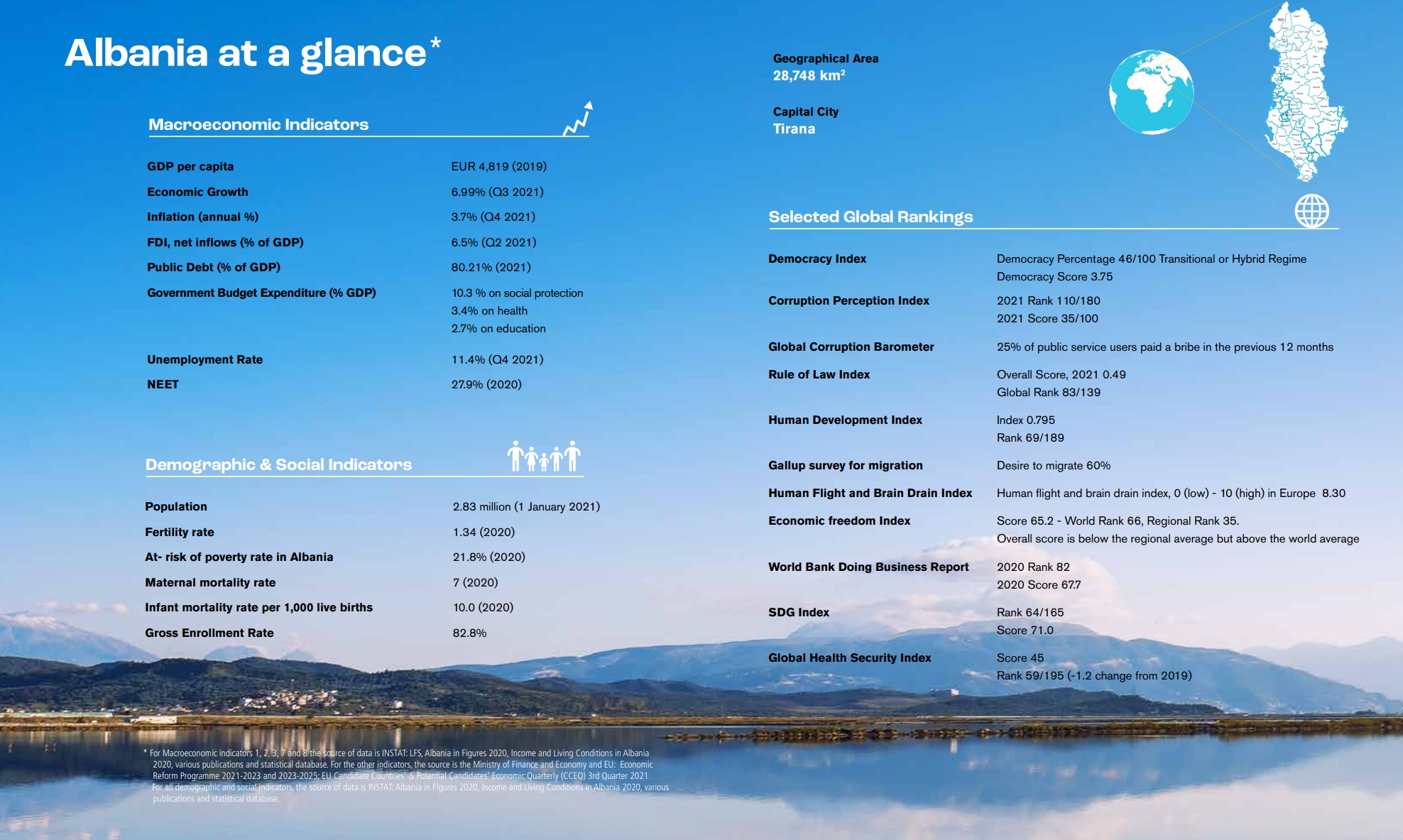Key developments
Albania is an upper middle-income country of about 2.8 million people with a high level of human development. The country is a member of NATO and of the UN Security Council 2022–2023, and is on a path toward accession with the EU.
Overall, and despite the challenges posed by the double shock of the earthquake of November 2019 and the Covid-19 pandemic, Albania has continued to show its commitment to EU-oriented reforms and delivered tangible and sustainable results. It has fulfilled all the conditions set out in the Council Conclusions of March 2020 for the first Inter-governmental Conference.
Albania is the only country in the region that has signed cooperation agreements with all justice and home affairs agencies of the EU. Yet, public sector performance is uneven, especially at local levels, impeding more effective design and implementation of policies and programmes associated with EU accession.
Albania’s economy growth rebounded to a projected 7.2 percent by the end of 2021, after the pandemic hit the Albanian economy hard. The country was subject to a smooth vaccination rollout, with no further lockdowns and continued recovery in services, led by tourism, and construction.
The labour market started its recovery in Q2 due to employment in construction and manufacturing, though agriculture continued to shrink.[1] The unemployment rate declined to 11.3 percent in Q3 with youth unemployment at 19.9 percent, from 20.7 percent in the same quarter of the previous year. Good progress was made to refocus health services at the primary level, introduce digital health services and improve transparency and accountability.

Yet, public spending on health, as a share of both GDP and total public spending is too low and created dependence of the health system on out-of-pocket payments. Increased investment is needed to drive and sustain more equitable growth. The 2021 Sustainable Development Report index score of 71 suggests that Albania is more than two-thirds of the way towards achieving the status of highest-rank, with a position of 64th out of 165 countries. Despite this progress, poverty remains high, at over 23 percent.[2]
Albania is party to the nine core international human rights treaties. The Rome Statute of the International Criminal Court and the main Council of Europe human rights instruments have been ratified. The most recent UPR process for Albania was completed in 2019 (3rd cycle), with the country accepting 186 of 197 recommendations. However, full and consistent implementation of the existing legislation is insufficient. Gender discrimination, a gender divide in the labour market and occupational segregation, and gender-based violence are concerns affecting particularly vulnerable women (Roma and Egyptians, people with disabilities, or from the LGBTQI+ community, rural and elderly).
The Voluntary National Review report notes that ‘inclusion is especially unsatisfactory for the poor, Roma and Egyptians, and persons with disabilities, posing significant challenges for achievement of the SDGs’. Children and women, particularly those in rural areas and from excluded groups, are most affected by poverty, which is concentrated in the mountainous central and northern prefectures (aligned with counties).
Albania is a transit country for economic migrants, refugees and asylum seekers, the majority from Iraq and Syria. Effective migration governance and border management is an important requirement for EU accession. The strong influence of politics and business over the media remains a key source of concern for freedom of expression in the country.
[1] World Bank–Western Balkans Regular Economic Report, No. 20, Fall 2021.
[2] UNSDCF for Albania 2022–2026.

